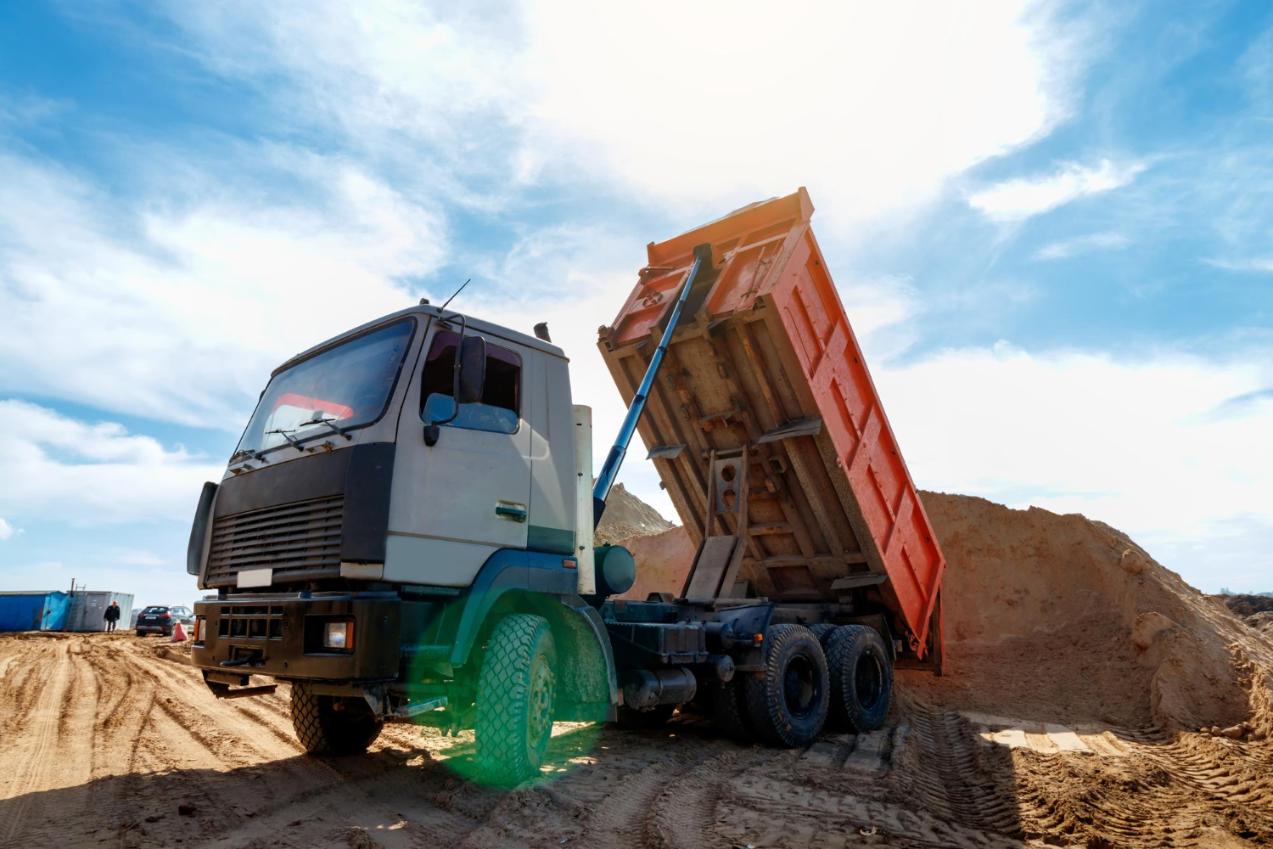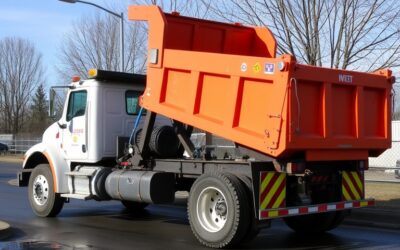Roll off dump trucks play a critical role in industries like construction, waste management, and recycling These trucks are designed to transport large containers filled with different types of materials. While they are highly functional, roll off dump trucks also come with their own set of risks. With their high center of gravity, these trucks are vulnerable to tipping, especially when loading or unloading — a serious safety risk for both operators and workers. This instability poses a significant safety threat to operators and nearby workers.
Understanding the Risks of Roll Off Dump Trucks
Roll off dump trucks are highly useful in transporting large containers of materials. However, their design and operation introduce specific risks that must be managed to ensure safe use.
One major risk is the high center of gravity. When roll off dump trucks carry heavy loads, their top-heavy nature increases the risk of tipping, particularly when containers are raised or lowered. This imbalance can lead to tipping over, particularly on slopes or uneven terrain. The risk is magnified when the truck bed is raised, increasing the center of gravity’s height.
Another concern is uneven load distribution. Roll off trucks often carry varied materials that can shift during transit. If the load moves unexpectedly, it can destabilize the truck, making it more prone to tipping. Proper loading practices are essential, but even then, material can settle or shift, creating an unexpected hazard.
Driver inexperience or error can also magnify the tipping risks. Maneuvering a heavy, potentially unstable truck requires skill and experience. Quick turns, rapid acceleration, or sudden braking can further destabilize the vehicle. Inexperienced drivers or those who ignore safety protocols increase the tipping risk.
Understanding these risks emphasizes why additional safety measures, such as anti-tip kits, are critical for operating roll off dump trucks safely.
Key Features of Anti-Tip Kits
Anti-tip kits are designed to mitigate the risks associated with roll off dump trucks. These kits include several key features that enhance safety and stability during operation.
- Tilt Sensors: Tilt sensors monitor the truck bed’s angle 24/7. If the bed tilts beyond a safe threshold, the sensors trigger alerts, warning the driver of the impending danger. This real-time feedback allows the driver to take corrective actions quickly.
- Automatic Bed Lowering: One of the most crucial features is the automatic lowering of the truck bed. When a tipping risk is detected, the system can automatically lower the bed to reduce the center of gravity, stabilizing the truck and preventing a tip-over.
- Control Units: These units integrate with the truck’s existing systems to provide comprehensive monitoring. They gather data from various sensors, such as load cells and speed monitors, to offer a complete picture of the truck’s stability. The control unit can take preemptive actions based on this data, ensuring the truck remains balanced.
- Real-Time Alerts: In addition to visual and audible warnings, some anti-tip kits provide real-time alerts directly to the driver’s cabin. Real-time alerts keep drivers constantly updated on truck stability, allowing them to act fast.
By incorporating these advanced features, anti-tip kits significantly enhance the safety of roll off dump trucks, reducing the likelihood of tipping incidents and ensuring safer operation for both the driver and those around the truck.
Benefits of Anti-Tip Kits for Roll Off Dump Trucks
Anti-tip kits provide multiple benefits that go beyond preventing tipping incidents. Implementing these kits in roll off dump trucks can significantly improve safety and operational efficiency.
First, safety is greatly enhanced. Anti-tip kits drastically cut down the chance of tipping, protecting both drivers and those nearby. By continuously monitoring the truck’s stability and taking corrective actions, these kits ensure the safety of both the driver and nearby workers. This proactive approach minimizes the chance of accidents, which can lead to costly injuries and potential fatalities.
Second, operational efficiency is improved. Tipping incidents often result in significant downtime for repairs and recovery. With anti-tip kits, trucks remain more stable, leading to fewer disruptions and more consistent productivity. This allows projects to stay on schedule and avoids the delays associated with accident recovery.
Third, financial savings are notable. Tipping accidents can burn a hole in your pocket, with repair costs, medical bills, and even legal fees. Costs can include repairs, medical expenses, and potential legal fees. By preventing these incidents, anti-tip kits save money in the long run, making them a smart investment for any operation involving roll off dump trucks.
Implementing these devices translates to a safer and more efficient working environment, benefiting everyone involved in the operation.
Implementing Anti-Tip Kits: Best Practices
To maximize the effectiveness of anti-tip kits, it is crucial to follow best practices during implementation. These guidelines ensure that the kits function optimally and provide the highest level of safety.
Step one: Get it installed right. Proper installation means all sensors and systems are correctly positioned for optimal function. Anti-tip kits must be installed correctly to work effectively. It is essential to follow the manufacturer’s instructions and possibly engage professional technicians for installation. Proper installation guarantees that all sensors and control units are correctly positioned and integrated with the truck’s systems.
Second, regular maintenance is key. Just like any other safety equipment, anti-tip kits require routine checks and maintenance. Regularly inspect sensors, control units, and wiring to ensure they are in good working condition. Address any wear and tear immediately to prevent system failures.
Training drivers to use the system effectively ensures they know exactly how to respond to alerts. Operators should be well-versed in how the anti-tip system works. This includes understanding the alerts and knowing how to respond to them. Training ensures that drivers can effectively utilize the kit and adhere to best practices for safe operation.
Lastly, customize the settings. Each operating environment and truck load is different. Adjust the anti-tip kit settings to match the specific conditions of your operations. Customization can enhance the kit’s performance, providing tailored protection against tipping.
By following these best practices, you can ensure that your anti-tip kits deliver optimal safety and efficiency.
Conclusion
Essential to many industries, roll off dump trucks come with one big risk: tipping. Understanding these risks and implementing effective solutions like anti-tip kits is vital. These kits provide crucial benefits, including enhanced safety, improved operational efficiency, and financial savings.
Investing in anti-tip kits is not just about compliance; it is about protecting lives, ensuring smooth operations, and safeguarding your investments. By following best practices during implementation, you can maximize the effectiveness of these kits and create a safer working environment.
The importance of anti-tip kits cannot be overstated. They are a wise investment for any operation involving roll off dump trucks. To enhance safety and efficiency in your operations, consider implementing these advanced safety solutions.
Make safety a priority today. Learn more about how anti-tip kits from Wink Anti-Tip can protect your roll off dump trucks and ensure a safer workplace. Contact us now to find out how we can help.





